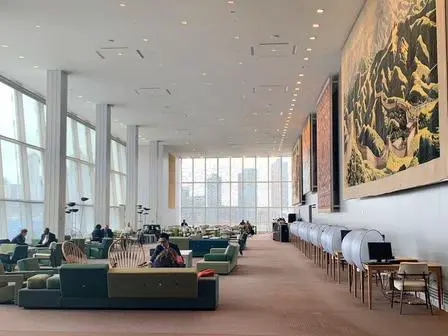People are scattered at the Delegates Lounge at the UN headquarters in New York, on March 12, 2020. (Xinhua/Wang Jiangang)
All staffers at UN Headquarters (UNHQ) in New York, unless their physical presence is indispensable for essential services, have been ordered to work from home in an effort to slow the spread of the coronavirus, while UN branches in other places have also tightened measures.
"I have therefore decided that from Monday, March 16, to Sunday, April 12, 2020, all staff will be required to telecommute and work remotely, unless their physical presence in the building is needed to carry out our essential work in New York and around the world," said the UN chief Antonio Guterres in a letter sent Friday to all UN staff seen by Xinhua.
The decision represented a major step-up in response to the virus that causes COVID-19, following the World Health Organization's declaration of a pandemic.
The decision also came after the first case of the novel coronavirus infection was confirmed on Thursday at UNHQ in New York.
A diplomat from the Philippine Mission to the United Nations, who visited the premises on Monday to meet with two other diplomats in a small conference room, tested positive for the virus.
The entire Philippine mission is in self-isolation.
Since Tuesday night, the UN complex has been closed to the general public and all guided tours have been suspended indefinitely.
Explaining his decision to step up precautionary measures, Guterres said the intention is twofold: "reduce our physical presence at United Nations headquarters; and continue delivering on our mandates."
"It is essential that we reduce social contact to a minimum and follow the clear instructions of the World Health Organization to minimize the risks of transmitting the infection," he said.
The UN chief pledged that the staff in the headquarters "will continue to provide critical support to our offices and missions in the field, as well as to the intergovernmental processes."
Guterres' Spokesman Stephane Dujarric said Friday that the United Nations will assess the necessity of maintaining a reduced level of staff in the building after three weeks.
UN staff members around the globe have been doing what they can to slow the spread of the virus in their workspaces, mostly by not working in them, Dujarric said.
As an example, security staff at UNHQ in New York reported 11,033 swipes at the different entrances to the compound on March 4, the day before the first measures were put in place. One week later, that figure dropped to 5,393.
"The preliminary numbers for today (Friday) showed an even steeper drop," he said. "The UN will continue to reduce its footprint" of staffers working on the nearly 7-hectare campus.
But Guterres, in overall charge of the fight against the coronavirus in the UN system, is overseeing the battle from his 38th-floor offices in the UN Secretariat building and not from home, the spokesman said.
The UN chief, however, is holding meetings in larger rooms with more space between participants heeding "social distancing" recommendations, he said Friday.
UN work will continue, including peacekeeping operations, humanitarian work, budget negotiations and essential meetings of the Security Council, he added.
The UN Children's Fund (UNICEF) has decided to close its building just across the street from the complex that houses the Secretariat, the General Assembly and the conference building.
"Out of an abundance of caution, we have taken the decision to close the UNICEF building and are strongly encouraging all our New York-based staff to work remotely for the next four weeks," it said in a statement.
"Three people working in UNICEF House in Midtown East, New York, have developed flu-like symptoms," the brief statement said. "They have not been confirmed positive to COVID-19."
At UN Headquarters in Nairobi, remote working has been mandated in order to substantially reduce personnel exposures to transit and other crowded areas, said Dujarric.
The UN resident coordinator in Iran has recommended working from home, he said. The decision followed steep increases in COVID-19 cases in Iran, including one UN staff member, he said.
In Geneva, guided tours have been suspended. Cultural events organized by member states and international organizations have also been suspended. As of next Monday, entrance to the Palais des Nations will be reserved for UN and non-UN personnel whose workplace is located in the complex, said the spokesman.
He added that people coming into the Palais for essential official meetings and journalists with permanent accreditation will be allowed in.
Dujarric said he would continue briefing correspondents daily from the usual briefing room in New York. But if necessary, he could brief from his living room.
The spokesman said he was planning to meet with officers of the UN Correspondents Association to arrange such briefings and the infrastructure to support them.
Journalists attending Friday's briefing, fewer in number than most days, spread themselves throughout the room, apparently to keep social distancing.
 简体中文
简体中文





